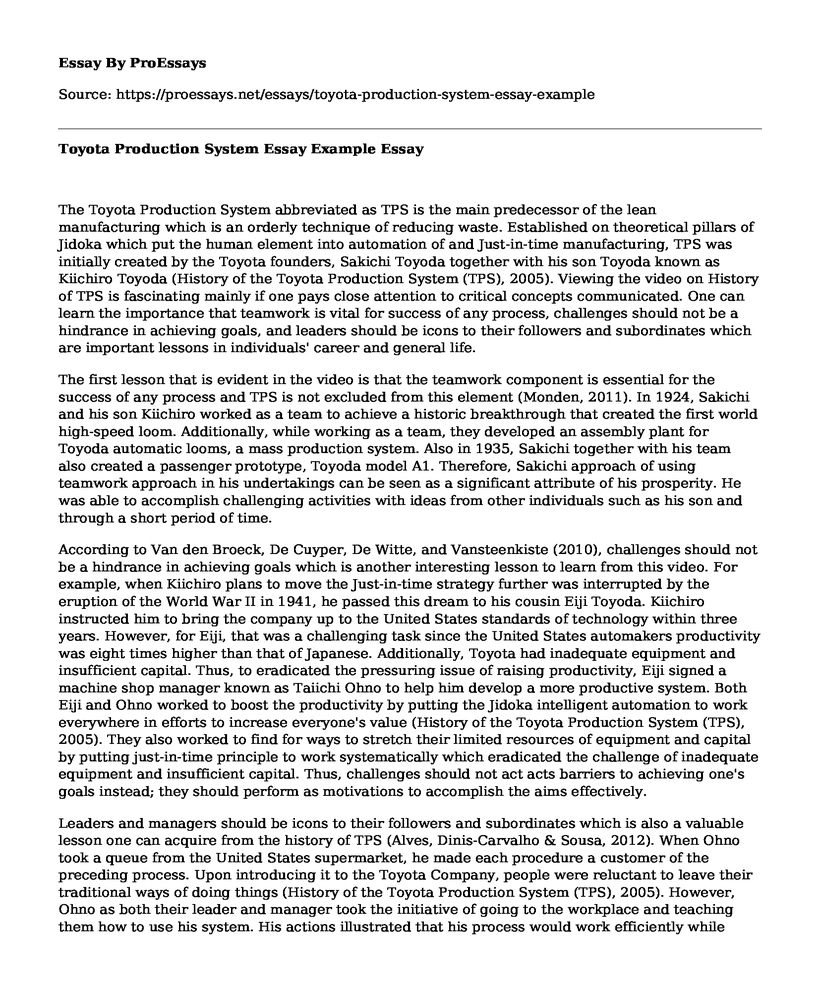The Toyota Production System abbreviated as TPS is the main predecessor of the lean manufacturing which is an orderly technique of reducing waste. Established on theoretical pillars of Jidoka which put the human element into automation of and Just-in-time manufacturing, TPS was initially created by the Toyota founders, Sakichi Toyoda together with his son Toyoda known as Kiichiro Toyoda (History of the Toyota Production System (TPS), 2005). Viewing the video on History of TPS is fascinating mainly if one pays close attention to critical concepts communicated. One can learn the importance that teamwork is vital for success of any process, challenges should not be a hindrance in achieving goals, and leaders should be icons to their followers and subordinates which are important lessons in individuals' career and general life.
The first lesson that is evident in the video is that the teamwork component is essential for the success of any process and TPS is not excluded from this element (Monden, 2011). In 1924, Sakichi and his son Kiichiro worked as a team to achieve a historic breakthrough that created the first world high-speed loom. Additionally, while working as a team, they developed an assembly plant for Toyoda automatic looms, a mass production system. Also in 1935, Sakichi together with his team also created a passenger prototype, Toyoda model A1. Therefore, Sakichi approach of using teamwork approach in his undertakings can be seen as a significant attribute of his prosperity. He was able to accomplish challenging activities with ideas from other individuals such as his son and through a short period of time.
According to Van den Broeck, De Cuyper, De Witte, and Vansteenkiste (2010), challenges should not be a hindrance in achieving goals which is another interesting lesson to learn from this video. For example, when Kiichiro plans to move the Just-in-time strategy further was interrupted by the eruption of the World War II in 1941, he passed this dream to his cousin Eiji Toyoda. Kiichiro instructed him to bring the company up to the United States standards of technology within three years. However, for Eiji, that was a challenging task since the United States automakers productivity was eight times higher than that of Japanese. Additionally, Toyota had inadequate equipment and insufficient capital. Thus, to eradicated the pressuring issue of raising productivity, Eiji signed a machine shop manager known as Taiichi Ohno to help him develop a more productive system. Both Eiji and Ohno worked to boost the productivity by putting the Jidoka intelligent automation to work everywhere in efforts to increase everyone's value (History of the Toyota Production System (TPS), 2005). They also worked to find for ways to stretch their limited resources of equipment and capital by putting just-in-time principle to work systematically which eradicated the challenge of inadequate equipment and insufficient capital. Thus, challenges should not act acts barriers to achieving one's goals instead; they should perform as motivations to accomplish the aims effectively.
Leaders and managers should be icons to their followers and subordinates which is also a valuable lesson one can acquire from the history of TPS (Alves, Dinis-Carvalho & Sousa, 2012). When Ohno took a queue from the United States supermarket, he made each procedure a customer of the preceding process. Upon introducing it to the Toyota Company, people were reluctant to leave their traditional ways of doing things (History of the Toyota Production System (TPS), 2005). However, Ohno as both their leader and manager took the initiative of going to the workplace and teaching them how to use his system. His actions illustrated that his process would work efficiently while providing workers with benefits such as improved productivity. Hence, this shows managers should be role models of their subordinates rather than directing them to do tasks on their own.
Conclusion
Acquiring various lessons from the Toyota Production System is essential not only an individual's career field but also in the general life. For instance, teamwork is an important concept which instills the importance of executing tasks jointly to reduce the time consumed. Challenges should also not be a barrier towards achieving the established goods, but they should act as the basis for motivation to accomplish more than required. Additionally, where one is appointed as a leader or manager, it is vital to know the significance of being an icon to subordinates and followers, an important initiative that can reduce change resistance. Therefore, the video on the history of TPS is an educative piece which graduate should watch before stepping in their future occupation to gain important lessons about the workplace.
References
Alves, A. C., Dinis-Carvalho, J., & Sousa, R. M. (2012). Lean production as promoter of thinkers to achieve companies' agility. The Learning Organization, 19(3), 219-237.
History of the Toyota Production System (TPS). (2005). [Video]. Retrieved from https://www.youtube.com/watch?v=ME3lN0hAymA#action=share
Monden, Y. (2011). Toyota production system: an integrated approach to just-in-time. Productivity Press.
Van den Broeck, A., De Cuyper, N., De Witte, H., & Vansteenkiste, M. (2010). Not all job demands are equal: Differentiating job hindrances and job challenges in the Job Demands-Resources model. European journal of work and organizational psychology, 19(6), 735-759.
Cite this page
Toyota Production System Essay Example. (2022, Jul 25). Retrieved from https://proessays.net/essays/toyota-production-system-essay-example
If you are the original author of this essay and no longer wish to have it published on the ProEssays website, please click below to request its removal:
- Risk Assessments in Global Projects Annotated Bibliography
- Incident Response Plan Paper Example
- Risk Management and Insurance Essay Example
- Similarities Between Skills Approach and Trait Theory - Research Paper
- Preliminary Report: Project Mgr Roles, Objectives & Responsibilities - Essay Sample
- Essay Sample on Leadership and Patient Safety Culture: Transforming Hope Hospital's ICU
- Team Assessment Exercise: Observing the Office for Successful Teamwork - Essay Sample







